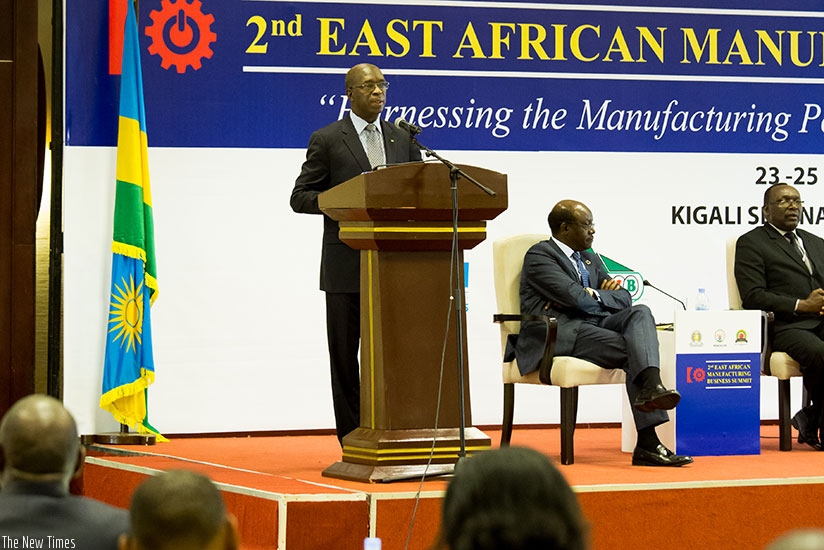The region’s manufacturing sector has huge potential and collective effort will be crucial for countries to exploit it, Prime Minister Anastase Murekezi has said.


The region’s manufacturing sector has huge potential and collective effort will be crucial for countries to exploit it, Prime Minister Anastase Murekezi has said.
Murekezi was speaking at the official opening of the second East African Manufacturing and Business Summit in Kigali yesterday.
He told regional policymakers, industrialists and other participants attending the summit that the East African Community has set out a target of ensuring that by 2032, the manufacturing sector will contribute 25 per cent to the bloc’s GDP.
Currently, manufacturing accounts for just 10 per cent of the GDP in the region.
Murekezi said it is expected that by 2032 the bloc will have diversified the manufacturing base and raised the value of local content of manufactured exports to at least 40 per cent from the currently estimated value of 8 per cent.
"To be able to achieve these targets, EAC must focus on full implementation of the Common Market Protocol as well as on value addition for export products. Therefore, our EAC industrialisation strategy and its action plan cannot simply be shelved documents. They must guide all our policy actions and deliver results,” the premier said.
He said the broad EAC industrialisation strategy (2012-2032) has identified strategic actions related to mineral processing, fertilisers and agrochemicals, pharmaceuticals, petro-chemicals and gas processing, agro-processing, and energy, and "we must focus on them consistently.”
"As EAC member states, we need to continue working as one team to harmonise our policies that will boost the manufacturing sector,” he said.
Lack of industrial genius
Ali Mfuruki, chairperson and chief executive of Infotech Investment Group, that is based in Tanzania, told the summit that the industrial genius is lacking on the continent and regional manufacturers and policymakers need to pay attention to how people are doing things elsewhere.
The issue is not lack of capital or all the other excuses people in the region are fond of giving, Mfuruki said.
The Tanzanian business mogul said the most educated "among us don’t seem to have that industrial genius” and unless people own up to the latter, the region will not see the desired change happening.
"We go on to write papers and books and research documents complaining about capital but there is a lot of wasted African capital on the continent that we don’t put to use, not because of the risks we claim are there but because our mentality simply isn’t there,” Mfuruki said.
Industrialisation is a nation building project, Mfuruki said, that cannot be built by the private sector alone or governments alone.
There has never been industrial success anywhere in the world when the collaboration between all stakeholders was not so deep and powerful as seen in Europe, the US, Japan and elsewhere, he said.
According to Lilian Awinja, the chief executive of the East African Business Council (EABC), while the region has been registering significant economic growth of more than six per cent for a number of years, the performance of the manufacturing sector is discouraging.
Awinja said that, apart from modest growth of the regional manufacturing sector of 4.7 per cent, its contribution to the bloc’s GDP has continued to shrink to less than 10 percent.
She said between 2000 and 2017, all EAC partner states – except Tanzania – have experienced shrinkage in the share of manufacturing sector in their national GDPs.
"The EAC region is very attractive with a combined population of 160 million and a combined GDP of over $150 billion and should automatically offer a market large enough to allow for explosive growth of the manufacturing sector,” Awinja said.
"Though the region has registered some achievements in terms of improving the business environment a lot remains to be done for the EAC to unlock its full potential in the manufacturing sector as the region aims to attain middle income economy status through industrialisation.”
Urging for the formation of stronger partnerships, François Kanimba, the minister for trade, industry and EAC affairs, said Rwanda has started implementing the directives of the 16th EAC Summit of Heads of State.
This February 2015 summit directed the Council of Ministers to, among others, study modalities for promotion of textiles and leather industries in the region as well as mechanisms for phasing out importation of used clothes, shoes, and other leather products.
Kanimba said: "This is the right time for stronger partnerships to be forged amongst various partners, especially among the public and private sectors and member state.”
editorial@newtimes.co.rw


